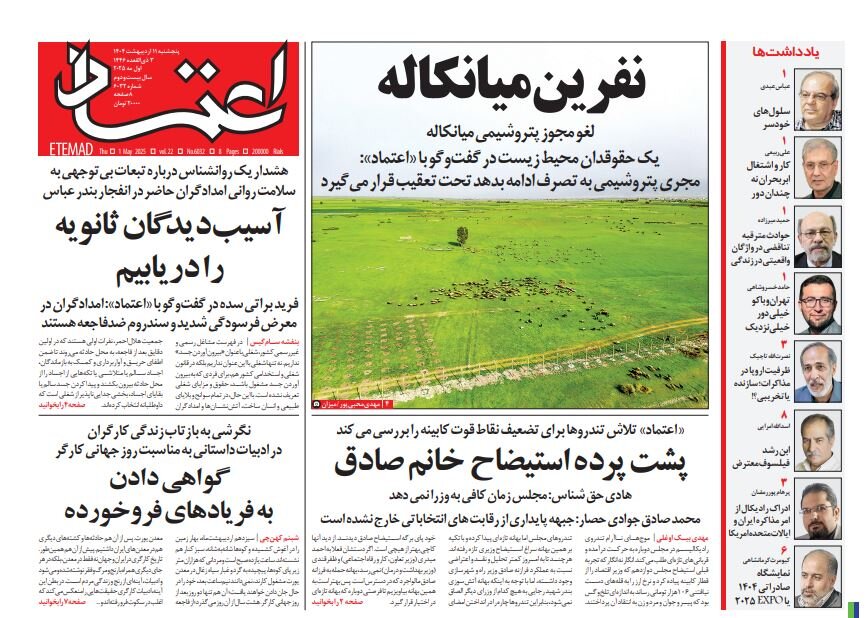Tehran and Baku are too far, too close

TEHRAN - In an analysis, Etemad discussed the importance of Iran-Azerbaijan relations.
It wrote: Pezeshkian's trip to Baku took place in sensitive circumstances because the ties between Tehran and Baku, after the ups and downs of recent years, need a new opportunity to repair and improve. The Israeli regime's intelligence activities in Azerbaijan and its malicious attempts to disrupt relations between the two neighbors are Tehran's most important concern; an issue that, without defining clear boundaries in the security sphere, could once again cast a shadow over relations. Disagreements related to transit projects, especially Iran's sensitivities to the developments in the Zangezur region and plans to change the regional geopolitics, are other areas of disagreement. In this situation, maximum use of the capacity in border provinces, drawing up transparent strategies to counter security threats, developing tangible economic projects, strengthening academic ties, and involving Iranian companies in the reconstruction of the newly liberated regions of the Republic of Azerbaijan can help strengthen ties. Pezeshkian's trip to Baku, if it leads to tangible results, can be an effective step towards rebuilding this neighborhood path.
Hamshahri: Trump’s words and actions don’t correspond
In a note, Hamshahri addressed the message of Mike Waltz (the White House National Security Advisor who has been fired from his post but as the U.S. ambassador to the UN), and the Americans' contradictory statements and wrote: The White House National Security Advisor said in his statements that Iran must understand that Trump wants peace and is ready for an agreement and Witkoff is waiting for Tehran to return to the negotiating table. This claim comes at a time when Iran has not withdrawn from the indirect talks with the United States, and last Saturday, after the third round of talks, Oman's Foreign Minister announced that the fourth round of talks would be held next Saturday (May 3). However, in recent days, Washington has undermined the diplomatic process by imposing new sanctions on Iran. These sanctions are designed in line with the failed and criminal policy of “maximum pressure” against the great nation of Iran. This is another clear evidence of the contradictory approach of American decision-makers and their lack of goodwill and seriousness in advancing the path of diplomacy. Therefore, the responsibility for the consequences of the contradictory behavior and provocative statements of American officials regarding Iran will lie with the American side.
Ham Mihan: China's support for Iran's nuclear diplomacy
In a commentary, Ham Mihan discussed China's support for Iran's nuclear diplomacy. It said: Chinese Foreign Minister Wang Yi, while supporting Iran's nuclear diplomacy, has appreciated Tehran's diplomatic efforts regarding its nuclear program. China previously played a key role in healing the wounds between Iran and Saudi Arabia. Analysts have seen this move as a sign of Beijing's desire to become an influential diplomatic power player in the Middle East. However, the recent crisis in Israel and Gaza, as well as the military operations of Ansarallah against commercial ships linked to Israel in the Red Sea, have challenged China's ability to play a constructive role in managing "hot global issues." China's appreciation for Iran's diplomacy indicates Beijing's desire to deepen relations with Tehran and play a role in the Middle East developments. However, the increase in U.S. sanctions and Trump's military threats (against Iran) indicate that the atmosphere of negotiations will stay tense. China's role as a mediator may be affected if regional crises intensify.
Arman-e-Emrooz: Iran's economy awaits green light from negotiations
Arman-e-Emrooz examined the situation in the Iranian market in light of the nuclear talks between Iran and the United States. The paper said: Iran's economy is awaiting the fourth round of nuclear negotiations. Since the third round of the negotiations between Iran and the United States was held on Saturday (April 26), the market is in a state of caution, which was in contrast to the previous two rounds of negotiations. From the point of view of traders, the market these days is optimistic about the negotiations, but there are traces of fear that may become exciting again with some news. However, market analysts believe that even if a possible agreement is reached between Iran and the United States, due to Iran's non-membership in the FATF, the banking system cannot use SWIFT, which will continue to be accompanied by problems in financial transactions. The market after the fourth round of negotiations between Iran and the United States will fluctuate greatly depending on whether the outcome of the negotiations is positive or negative, and traders are already waiting to see what the market conditions and prices will be like if the outcome of the fourth round of negotiations is positive.
Leave a Comment